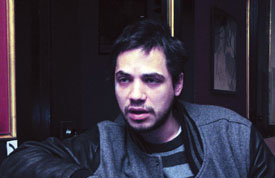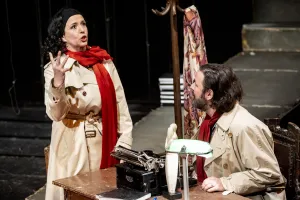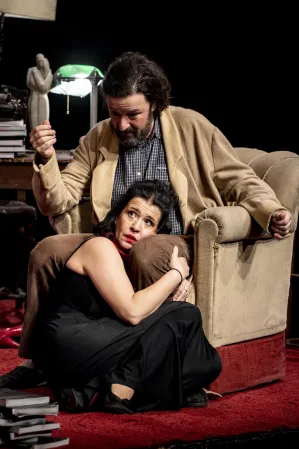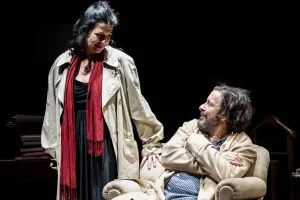Small marital crimes
drama by Eric E. Schmitt

The Real Killers in Small Marital Crimes
We always expect the Other to have the answer, we expect him/her to be the answer, which is the source of all the pain we inflict on each other in love. In love, we do not accept things that remain inexplicable: remoteness, emptiness that lingers after sexual satisfaction, contented body, everything that opens the way to soul and therefore, represents a way to separation between human beings. We like to think that we own other human beings, but in fact, we ourselves become possession. People invented love because of sex: and a body cannot give full satisfaction. Will we accept this? Do we accept our significant other with his/her unlimited differences? That is a price of happiness, although we are all well aware that a man is only rarely ready to be happy. Happiness is too difficult. We force others into Pain because of all our unsatisfied wishes, either because they represent our wishes or because we want them to stop being that. Pain is always easier. Schmitt in his Little Marital Crimes tackles the problem of pain. In both plays (Enigma Variations and Little Marital Crimes), a man reveals infinitely mysterious character of the Other. However, in the first one the character faces devastation as a result of his experience; while in latter one the character’s lucidity enables him to accept the Other and to establish a relationship, although there will be uncertainty which keeps the other one in a closed circle. “When you see a man and a woman getting married, you ask yourself ‘Which one of the two will become a killer?’” Is the love pain inevitable? Do we all tend to reduce the Other to a minimum and to reduce his/her differences? Gilles and Lisa meet again after Gilles’s accident that resulted in amnesia. He does not recognise Lisa. Is she really his wife? Is it really their apartment, his apartment? He does not know himself. He asks questions. She does not accept his behaviour: he is her husband and that’s it! He still doubts, “People told me that there is a network of widows who traffic with people with amnesia”. Gilles’s amnesia will enable them to go innocently to the bottom of their marriage. What will they discover there? Were they jealous? Did they have reasons to be jealous? However, it turns out that everything alludes to fidelity at both sides. The trouble is that he liked to look at younger women. “A woman starts taking notice of her own age the moment when she discovers that there are younger women around.” We constantly question ourselves, even when we want to stop doing that. Are we truly what we represent with our appearance? (…) What about Gilles’s books? They are dark novels, filled with villains, murderers and enemies. Are not his novels a metaphor of marriage? “Deception becomes a masterpiece! In the name of a family, the two enemies will find justification for everything. A family is the climax of their pretence. Eventually, killers grow old and their children go away to start new marriages, new duos of killers. A married couple becomes a metaphor; his novel becomes a problem. Reconciliation will have to travel the path of new introduction, learning about each other, of what they really are, each person for itself, for the other. (…) She does not write novels, her achievement is her marriage and this is why Gilles should not go. She discovered love: it is a thought that an absent person leaves in the Other to keep him/her company as the time passes by in absence. Absence in presence is maybe opposite to God, who is presence in absence. Nevertheless, it is similar anyway. However, the question remains, “Who will kill his/her significant other?” Should we take it literally? In novels (or dramas), we probably should. Nonetheless, there is violence; violence of older towards younger people, violence of men towards women; violence in a slave-like love. She read Gilles’s book Little Marital Crimes. She read everything about disappearance of love, she recognized all metaphors, masks and, beyond them, violence as the only consistency, the only reality of marital relationship in Gilles’s point of view. Then she paid attention to herself in this reality and assessed it: does it apply for her too? Is her marriage really reduced to empty reality devoid of illusion? “And let’s continue, why? I read this in your book too. A man and a woman remain together only because they nurture the lowest, meanest and worst: interest, anxiety of change, fear of old age, fear of loneliness. They hold each other’s hand only because they do not want to walk alone towards the grave”. He revealed it all and reduced everything to consistency, while love is still a metaphor, love is 2 = 1, two human beings who make one. In order not to reveal that this is only one point of view to reality, the metaphor is transformed into another one that turns illusion into reality. (…) Two fundamental issues remain forever and they actually torture human beings. Do I really want to live with this man or this woman until the end of my time? Could I live without her/him? Besides answers to these questions, what remains uncertain is the issue of who is actually the Other, uncertainty we suffer because of his/her presence, because of his/her existence, untouched beauty and because of affection he or she creates with it. If we choose to close our eyes in front of the fact that our relationship with the Other is inexplicable, if we want to reduce the relationship to answers that label and limit us, then we are all losers. Love is acceptance – Is it with the help of illusion? – the acceptance of the metaphor on which every wish in life and every hope of redemption gets stranded. Furthermore, there is the main question; Will you save me from myself, from me who fails in it, because I am only I? If we deduce from the metaphor of love what it so successfully hides, than we kill love, the same way time or predators do, when they want to impose themselves forcefully onto a married couple. Maybe, they are the actual killers in little marital crimes.
Michel Meyer, Éric-Emmanuel Schmitt ou les identités bouleversées, Published by Albin Michel, Paris, 2004
 ERIC-EMMANUEL SCHMITT
ERIC-EMMANUEL SCHMITT
Born in 1960, he attended the prestigious Ecole Normale Supérieure where he was awarded a doctorate in Philosophy and the top French teaching qualification. Schmitt first made a name for himself in the theatre with The Visitor, a play that posits a meeting between Freud and – possibly – God; the work soon became a classic and is now part of international repertoire. Further successes quickly followed, including Enigma Variations, The Libertine, Between Worlds, Partners in Crime, My Gospels and Sentimental Tectonics. Acclaimed by audiences and critics alike, his plays have won several Molières and the French Academy’s ‘Grand Prix du Théâtre’. His books have been translated into 43 languages, and more than 50 countries regularly perform his plays. Much of his literary career has been devoted to writing novels. In 2010 his third book of short stories, Concerto in Memory of an Angel, was awarded the prestigious Prix Goncourt de la Nouvelle (short story). His latest novel is Ulysses from Bagdad. Odette Toulemonde, the first motion picture he wrote and directed has been running on European screens in 2007. Encouraged by this international success, he has adapted Oscar and the Lady in Pink for the screen, to reach cinemas in late 2009. A keen music-lover, Eric-Emmanuel Schmitt has also translated into French The Marriage of Figaro and Don Giovanni from the original Italian. His fertile imagination continues to open new doors and cast unusual reflections. Within a decade, Eric-Emmanuel Schmitt has become one of the most read and acted French-language authors in the world.
According to: www.eric-emmanuel-schmitt.com
 FILIP GRINVALD
FILIP GRINVALD
Filip Grinvald was born in 1984 in Belgrade. After several years in Youth Theatre “Dadov”, he starts studying theatre directing at the Faculty of Dramatic Arts in Belgrade, in the class of Professor Egon Savin. He graduated in 2007, by directing a production of Mirandolina by C. Goldoni in the National Theatre in Sombor. In 2008, at the 48th MESS International Theatre Festival in Sarajevo he wins the Best Young Director Award, for The Path of the Wild Animals by F. K. Kretz, the production of the National Theatre of Republika Srpska. He currently works as an Assistant Professor of Theatre Directing at the Faculty of Dramatic Arts in Belgrade, at the Department of Theatre and Radio Directing, with Professor Nikola Jevtić. He also directed the following plays: The Path of the Wild Animals by F. K. Kretz in the National Theatre of Republika Srpska, Banja Luka; Rabbit Hole by D. L. Abaire in Belgrade Drama Theatre; A Balloon of Rocks, My Memoires by R. Smiljanić in the National Theatre of Republika Srpska, Banja Luka; The Marrying by J. S. Popović in the National Theatre Kikinda; The Zoo Story by E. Albee in the National Theatre of Republika Srpska, Banja Luka; The Arabian Night by R. Schimmelpfennig in Bosnian National Theatre Zenica and in the National Theatre Tuzla. Since 2008, his production of Vitamins by Vera Ion has constantly been on the repertoire at “Raša Plaović“ Stage (National Theatre in Belgrade).
Critics on Little Marital Crimes
A play that doesn’t pull its punches and will have audiences on the edge of their seats, laughing and terrified by turns. (…) Eric-Emmanuel Schmitt controls the brief exchanges with awesome precision and provides theatre directors with all the necessary stage directions.
EWI, La Liberté (Suisse)
A man has received a blow on the head and finds himself back in his flat with a woman he does not know but who is nevertheless his wife. His confusion is the result of amnesia - or so we are led to believe, for Schmitt has more than one coup de théâtre up his sleeve. Repeatedly, the characters turn out to be other than we imagined. In contrast to the usual gender stereotyping, neither is a stranger to harshness and criminal impulses. Marital relationships are the central theme in this chiaroscuro play where calm alternates with violence, courtesy with brutality, dawdling with haste. On the face of it, the iron hand is in the velvet glove, as Gilles and Lisa strive to shield one other from the truth. At a deeper level, this is a treatise on the human bonds that get worn away and whose only salvation, or second wind, is possible through a crisis and the resolution of that crisis. Schmitt engagingly disentangles the old-fashioned and modern elements in the emotional and amatory behaviour of contemporary man... and woman.
Gilles Costaz, Magazine Littéraire
Just when you thought you’d caught the leaf fluttering in the breeze, the wind picks up and whips it away; the instant you think you’ve hit on a truth, new information refutes it and leaves you at a loss. The gradual undermining of our certainties is the subject of Eric-Emmanuel Schmitt’s new play, Conjugal pecadillos (Petit Crimes conjugaux). From the author or Enigma Variations comes another psychological ‘thriller’ that shows him at his mischievous best, revelling in his authorial omniscience, manipulating and puzzling both characters and audience. You can almost see him sneaking about in the background, rubbing his hands in glee at the farce he’s concocted. (...) Conjugal Pecadillos is a sparkling comedy but there’s scarcely a glimmer of optimism.
Armelle Héliot, Le Figaro
A work so intelligent it makes the audience feel intelligent.
André Lafargue, Le Parisien
A man and a woman: a couple involved in a war of attrition. What could be more frayed or fundamental than a married couple? (...) Schmitt’s sense of dialogue, suspense and drama has gone from strength to strength since The Visitor and Enigma Variations. His talent for keeping the audience on the edge of their seats has here reached new heights. In this double act on the theme of two characters in search of the truth about each other, the twists and turns are far too many and too ingenious to penetrate.
Annie Coppermann, Les Echos
Love and conjugal life are the subject of this play. What happens between a lady and gentleman, however intelligent, however well disposed towards each other and however well-balanced, after 15 years’ cohabitation? The answer is bleak: it’s hell...
Bernard Thomas, Le Canard Enchaîné
... it’s written theatre, and well written, where every expression is exactly right and the lines bounce off each other as naturally as a tennis ball, in the best manner of psychological drama. (...) This is theatre which it is a genuine pleasure to read.
B.P, Le Bulletin des Lettres
It makes first-class theatre on the subject of marriage, white lies and deceptive appearances...
Sud-Ouest Dimanche
Premiere performance
Premiere 16 April 2011
"Raša Plaović" Stage
Eric E. Schmitt
SMALL MARITAL CRIMES
Translated from French by Stanica Lazarević
Director Filip Grinvald
Dramaturge Željko Hubač
Set Designer Boris Maksimović
Costume Designer Sara Kurtović
Music selection by Filip Grinvald
Sound design by Vladimir Petričević
Stage Speech Ljiljana Mrkić Popović
Premiere Cast:
Lisa Nela Mihailović
Gilles Boris Pingović
Producer Barbara Tolevska
Stage Manager Miloš Obrenović
Prompter Danica Stevanović / Sandra Todić
Lighting Master Srđan Mićević
Make-Up Artist Dragoljub Jeremić
Stage Master Nevenko Radanović
Sound Master Roko Mimica
Décor And Costumes Have Been Manufactured In Workshops Of The National Theatre







